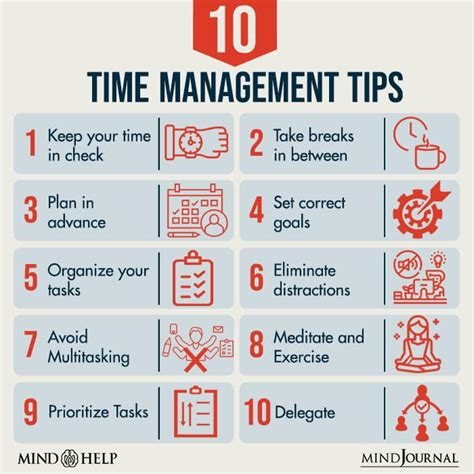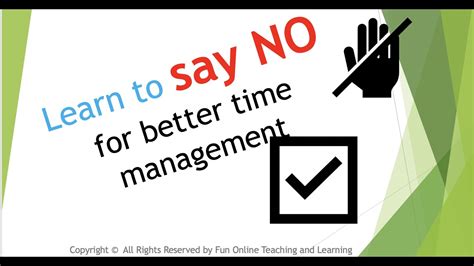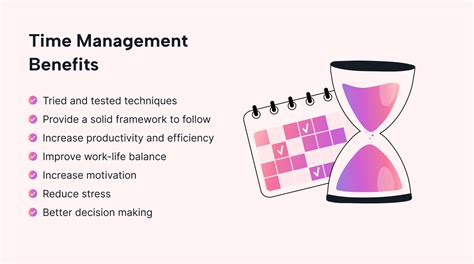Time is a precious resource that often seems to slip through our fingers, leaving us feeling overwhelmed and unproductive. In today's fast-paced world, mastering the art of time management has become more crucial than ever before. As we navigate through our daily commitments and obligations, finding effective strategies to optimize our use of time can make a significant difference in our productivity and overall success.
In this article, we will explore seven dynamic approaches to improve time management skills, allowing you to regain control over your schedule and accomplish more in less time. These strategies offer practical and adaptable solutions that can be tailored to fit your specific needs and preferences.
1. Prioritization: One of the key factors in effective time management is the ability to identify and prioritize tasks. By acknowledging the importance and urgency of each task, you can allocate your time and energy accordingly. Differentiating between essential tasks, those that require immediate attention, and less critical ones will enable you to focus on what truly matters, increasing both efficiency and productivity.
2. Delegation: Recognizing that you don't have to do everything yourself is a fundamental aspect of time management. Delegating tasks to others who are capable and available not only relieves you of unnecessary burdens but also frees up valuable time that can be utilized for more important responsibilities. Embracing delegation allows you to leverage the skills and abilities of others, accomplishing more collectively.
3. Minimize Distractions: In today's digital age, distractions are abundant and can significantly impact our ability to manage time effectively. To enhance productivity, it is essential to minimize distractions and create a focused work environment. Turning off notifications, organizing your workspace, and using tools that block or limit distractions can help maintain your concentration and keep you on track.
Prioritize Your Tasks and Set Clear Goals

In order to effectively manage your time, it is essential to prioritize your tasks and set clear goals. By determining which tasks are most important and organizing them in order of importance, you can ensure that you are allocating your time and energy efficiently.
One effective way to prioritize your tasks is by creating a to-do list. This list can outline all the tasks you need to accomplish, allowing you to visually see what needs to be done. Additionally, consider assigning deadlines or timeframes to each task to further prioritize and manage your time effectively.
- Start by identifying the tasks that are most urgent and important. These tasks should be given top priority and completed first.
- Next, focus on tasks that are important but not urgent. While they may not have immediate deadlines, they contribute to long-term goals and should not be neglected.
- Consider delegating tasks that are important but can be done by someone else. This can help free up your time to focus on more critical tasks.
- Less important tasks can be postponed or eliminated altogether if they do not align with your overall goals.
Setting clear goals is also crucial for effective time management. By establishing specific, measurable, attainable, relevant, and time-bound (SMART) goals, you can stay focused and motivated throughout the task completion process.
When setting goals, ask yourself the following questions:
- What is the specific outcome I want to achieve?
- How will I measure my progress towards this goal?
- Is this goal realistically achievable given the available resources and timeframe?
- Does this goal align with my overall objectives and priorities?
- When do I want to accomplish this goal by?
By answering these questions, you can create clear and actionable goals that serve as a roadmap for your time management efforts.
Remember, prioritizing your tasks and setting clear goals are essential strategies for maximizing your productivity and achieving success.
Break Down Large Projects into Smaller Tasks
Breaking down big projects into smaller tasks is a valuable strategy that aids in effectively managing your time and accomplishing your goals. By dividing extensive projects into more manageable components, you are able to gain a clearer understanding of the tasks at hand and can allocate your time and resources more efficiently.
When faced with a substantial project, it can be overwhelming to tackle it as a whole. However, by breaking it down into smaller tasks, you create a roadmap that allows you to prioritize and focus on one task at a time. This approach aids in reducing stress and increasing productivity by providing a step-by-step process that is easier to handle.
By dividing large projects into smaller tasks, you also gain a sense of accomplishment as you complete each task along the way. This boosts your motivation and confidence, enabling you to maintain momentum and stay on track to meet your deadlines.
Furthermore, breaking down big projects allows you to identify any potential obstacles or challenges that may arise. By addressing these issues during the planning phase, you can proactively devise strategies to overcome them. This proactive approach helps to minimize unexpected delays and ensures smoother progress throughout the project.
Additionally, breaking down tasks facilitates collaboration and delegation within a team setting. Each team member can be assigned specific tasks based on their skills and strengths, leading to a more efficient and cohesive project execution. By utilizing the expertise of each team member, you can maximize productivity and achieve optimal results.
In conclusion, breaking down big projects into smaller tasks is a practical and effective method to improve time management. It allows for better organization, enhances productivity, boosts motivation, and facilitates teamwork. By implementing this approach, you can effectively manage your time and successfully accomplish your goals.
Improve Time Organization using Specialized Strategies and Tools

Efficient utilization of time is crucial for achieving productivity and success in various aspects of life. To enhance your time management skills, it is essential to harness the power of effective techniques and utilize specialized tools designed to optimize your daily routine.
One way to optimize time management is by utilizing technology-based tools specifically designed for this purpose. These tools can range from mobile applications and software programs to smart devices and online platforms. They provide features such as task scheduling, reminders, and progress tracking, enabling individuals to prioritize and manage their time effectively.
Time tracking apps: These apps allow you to monitor and analyze how you spend your time. By providing detailed insights into your activities, they help identify areas where you may be wasting time and allow you to make necessary adjustments to improve efficiency. | |
Task management tools: These tools assist in creating to-do lists, setting deadlines, and assigning priorities to different tasks. They ensure that you stay organized and focused on completing important tasks while avoiding unnecessary distractions. | |
Calendar apps: Calendar apps help you schedule appointments, meetings, and deadlines, ensuring that you never miss important commitments. They provide reminders and notifications, allowing you to plan your day effectively and allocate time for various activities. |
In addition to technology-based tools, various time management techniques can enhance your overall organizational skills. These techniques involve strategies such as prioritizing tasks, breaking them down into smaller manageable chunks, and creating a structured schedule.
Task prioritization: By categorizing tasks based on their importance and urgency, you can allocate your time and energy accordingly. Prioritizing tasks ensures that you focus on high-priority activities first and prevents you from getting overwhelmed by less critical tasks.
Chunking: Breaking down larger tasks into smaller, more manageable chunks helps you approach them systematically. This technique allows you to allocate specific time slots for each chunk, making it easier to focus and accomplish the overall task efficiently.
Structured scheduling: Creating a well-organized schedule helps you allocate time slots for various activities throughout your day. By setting specific time frames for different tasks, meetings, and breaks, you can optimize your productivity and ensure a balanced work-life harmony.
By incorporating time management tools and techniques into your daily routine, you can elevate your organizational skills and effectively manage your time. These strategies and tools act as valuable aids in prioritizing tasks, tracking progress, and achieving goals efficiently.
Avoid Procrastination and Maintain Concentration
In the pursuit of optimizing time usage, it is essential to address the issue of delaying tasks and ensuring we remain focused on our objectives. By actively avoiding procrastination and promoting unwavering concentration, we can significantly enhance our ability to manage time effectively and efficiently.
One key aspect of defeating procrastination is understanding the underlying reasons for our tendency to delay tasks. It is crucial to identify and acknowledge any internal or external factors that contribute to this behavior. By recognizing these influences, we can implement appropriate strategies to counteract them.
Eliminate Distractions:
| Set Clear Goals and Deadlines:
|
Develop Effective Time Management Techniques:
| Seek Accountability:
|
Reward System:
| Practice Self-Discipline:
|
By incorporating these strategies into our daily routines, we can successfully avoid procrastination, stay focused, and maximize our time management abilities. Remember, effective time management is not just a skill - it is a mindset that requires consistent effort and commitment.
Delegate Tasks and Learn to Say No

Efficient allocation of responsibilities and effective refusal are key strategies to optimize time utilization and improve personal productivity.
Boost Productivity with Regular Breaks and Energy Management
One effective approach to optimizing productivity and maintaining high energy levels throughout the day is by incorporating regular breaks into your schedule. These intervals of rest are essential for recharging your mind and body, allowing you to refocus and improve overall performance.
Developing a structured break routine can help you avoid burnout, reduce stress levels, and enhance your ability to concentrate. By strategically managing your energy levels, you can maximize productivity and accomplish tasks more efficiently.
During breaks, engage in activities that promote relaxation and rejuvenation. This can include short walks, stretching exercises, deep breathing exercises, or even meditation. Such activities help clear your mind, release tension, and increase alertness upon returning to work.
In addition to incorporating regular breaks, it is important to pay attention to your energy peaks and troughs throughout the day. Everyone has certain times when their energy levels naturally fluctuate. By identifying your own energy patterns, you can schedule tasks that require intense focus and concentration during your energy peak periods and reserve simpler or less demanding tasks for your energy low points.
Moreover, ensure that you are properly fueling your body by eating nutritious meals and snacks throughout the day. Avoid consuming too much caffeine or sugary foods, as these can lead to crashes and hinder productivity. Opting for balanced meals that include lean proteins, whole grains, and plenty of fruits and vegetables can help sustain your energy levels throughout the day.
Remember, taking regular breaks and managing your energy levels are integral parts of effective time management. By incorporating these practices into your routine, you can boost productivity, maintain focus, and achieve better overall results in your daily tasks.
Discovering and Evaluating Your Approach to Organizing and Using Time

In this section, we will explore the crucial practice of reviewing and reflecting on your habits related to managing and utilizing time. By taking the time to step back and assess your current approach, you can gain valuable insights into areas where improvements can be made and identify strategies that work best for you.
Begin by examining your daily routines and habits. Consider how you prioritize tasks and allocate time to different activities. Reflect on whether you tend to procrastinate or easily get sidetracked, and try to identify the underlying reasons why these patterns occur. Recognizing any common obstacles or distractions that hinder your productivity can help you develop strategies to overcome them.
Next, take a closer look at how you plan and organize your schedule. Evaluate the systems or tools you currently use and determine if they effectively support your productivity. Consider experimenting with different methods to find what suits your needs best, whether it's using digital calendars, to-do lists, or time-blocking techniques. Additionally, think about how you can optimize your workspace to minimize distractions and create an environment conducive to focused work.
Furthermore, reflection also involves analyzing how you use your time throughout the day. Are you prone to multitasking, or do you prefer focusing on a single task at a time? Reflect on the impact these approaches have on your productivity, attention span, and overall well-being. Explore techniques like time tracking or implementing structured breaks to improve your concentration and maintain your energy levels.
Moreover, review your habits regarding time estimation and setting deadlines. Reflect on whether you tend to underestimate or overestimate the time required for certain tasks, which can lead to poor time management. Being aware of your time estimation tendencies can help you allocate your resources more effectively, ensuring tasks are completed within the desired timeframe.
Lastly, consider seeking feedback from trusted colleagues, mentors, or friends who have observed your time management habits. Their perspectives can provide valuable insights and objective observations that you may not have considered. Embrace constructive feedback and use it to refine your approach and enhance your time management skills further.
FAQ
What are some effective ways to enhance time management skills?
There are several effective ways to enhance time management skills. First, prioritize tasks by creating a to-do list and organizing it based on importance and deadlines. Second, minimize distractions by turning off notifications and finding a quiet workspace. Third, break tasks into smaller, manageable chunks to make them less overwhelming. Fourth, practice effective delegation by outsourcing tasks that can be done by others. Fifth, set realistic and achievable goals to stay motivated. Sixth, learn to say no to tasks that do not align with your priorities. Finally, regularly evaluate and reflect on how you spend your time to identify areas for improvement.
How can I prioritize my tasks effectively?
To prioritize tasks effectively, start by creating a to-do list that includes all the tasks you need to complete. Then, rank the tasks based on their importance and urgency. You can use tools like the Eisenhower Matrix or the ABCDE method to help with prioritization. The Eisenhower Matrix categorizes tasks into four quadrants: important and urgent, important but not urgent, urgent but not important, and not important and not urgent. This helps you focus on tasks that have the highest priority. The ABCDE method involves assigning a letter to each task (A being the highest priority) and then organizing tasks within each category based on their importance. By following these methods, you can effectively prioritize your tasks and manage your time more efficiently.
How can I avoid distractions and improve my focus?
Avoiding distractions and improving focus can greatly enhance time management skills. To minimize distractions, start by turning off notifications on your phone or computer. This will reduce the temptation to constantly check for new messages or updates. Find a quiet workspace where you can concentrate without interruptions. Use techniques like time blocking, which involves dedicating specific periods of time to focused work and avoiding multitasking. You can also try the Pomodoro Technique, where you work for a set amount of time (e.g., 25 minutes) and then take a short break before starting another work session. By implementing these strategies, you can create a more conducive environment for concentration and improve your overall focus.





